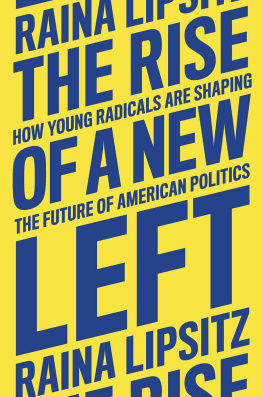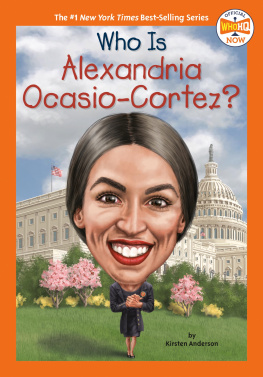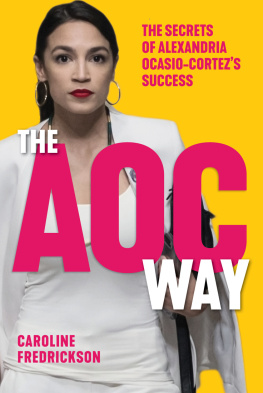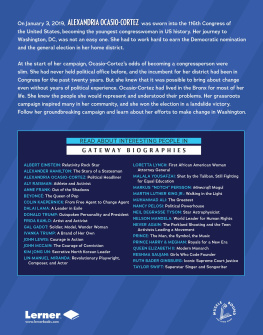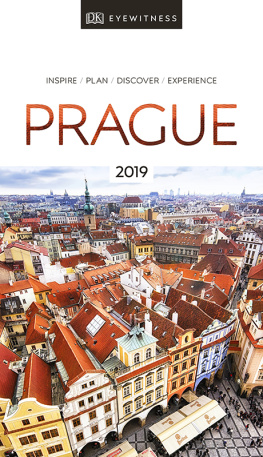
Simon & Schuster
1230 Avenue of the Americas
New York, NY 10020
www.SimonandSchuster.com
Copyright 2019 by Lauren Duca
All rights reserved, including the right to reproduce this book or portions thereof in any form whatsoever. For information, address Simon & Schuster Subsidiary Rights Department, 1230 Avenue of the Americas, New York, NY 10020.
First Simon & Schuster hardcover edition September 2019
SIMON & SCHUSTER and colophon are registered trademarks of Simon & Schuster, Inc.
For information about special discounts for bulk purchases, please contact Simon & Schuster Special Sales at 1-866-506-1949 or .
The Simon & Schuster Speakers Bureau can bring authors to your live event. For more information or to book an event, contact the Simon & Schuster Speakers Bureau at 1-866-248-3049 or visit our website at www.simonspeakers.com.
Interior design by Carly Loman
Jacket design by David Litman
Jacket art by Superstock/Getty Images
Library of Congress Cataloging-in-Publication Data is available.
ISBN 978-1-5011-8163-4
ISBN 978-1-5011-8165-8 (ebook)
For Laura
INTRODUCTION
THE BEFORE TIMES
Before the 2016 election, I only ever understood politics as a spectator sport. Actually, watching football is a frighteningly accurate metaphor for the way I learned about politics growing up. Every four years, everyone would gather around for the election, or as I came to understand it, the big game. There were teams, and little reason to deviate from whichever one to which you had previously pledged loyalty. Without intricate knowledge of the inner workings of the sport, you might watch along with passive interest, mostly to see who was going to win. (Also, obviously, the men were always yelling louder than anyone else.)
I suppose I first understood my parents were Republicans when my mom told me that I should vote for Bob Dole in a mock version of the 1996 election at my elementary school. I can still smell the marinade of low-grade sloppy joe meat in the cafeteria on that day. I remember standing in front of a big box covered in aluminum foil, staring at the paper ballot featuring Bill Clinton (Democrat) and Bob Dole (Republican), along with a portrait of each. Waiting on the line leading up to the table, I decided that, actually, I liked the other guy better. (Id love to tell you I was developing a fiery political ideology in kindergarten, but that came later. Mostly Bob looked super old.)
Not long after that mock version of the 1996 election, I knew that I was cheering for the other team. During my junior year of high school, I learned that seven in ten children go on to affiliate with the same party as their parents. I definitely thought, Not me, Gallup Poll.
My worldview has long been rooted in a desire to leave the world a better place than I found it. Before I had access to the word feminism or was introduced to the wide-reaching effects of institutionalized racism, I understood true equality to be the highest possible good. This was precisely as complex as my unquestioned support for LGBTQ rights, which developed well before I began to understand my own sexuality as a queer woman. My views have become more nuanced over time, but I have always believed in the necessity of equity with total conviction, and that ethical priority was as simple as the fact that I had so many gay friends in high school my parents called me Liza Minnelli. (Media illiteracy has warped the concept of bias, but if you would like to say I am biased toward equality, Im okay with that. Id go one step further and argue that establishing equity ought to be the ultimate mission of any true democracy, but well get to that later.)
My parents were confounded by my passion for social justice, evidenced, in part, by the massive pride flag hanging in my bedroom during the fight to legalize gay marriage. They were confused by my literal and figurative flag waving. We never talked about that, because as far as my mom and dad were concerned, political issues were something that could be swept out of view. In the rare instances when they dedicated energy to politics, they prioritized economic policy, which is to say, they showed up every four years to vote Republican because of the tax breaks.
I disagreed with their ideology, but I usually accepted their attitude. I avoided talking about politics growing up, too. My parents, brother, and I are textbook hotheads when were around one another. (People often explain this to me by saying its because were Italian, as if our blood has been replaced with very spicy red sauce.) When my mom and dad told me to stop talking about politics, they were mostly hoping we would have one less thing to yell about.
Still, the stigmatization of political discussion was not specific to my household. In various settings of suburban New Jersey, the adults in the room were wary of the tensions that might arise. Engaging in political conversation was as crass as showing up for the neighborhood Super Bowl party without a chilled bottle of pinot grigio. This became more obvious as I grew older, but it started early. When we role-played the 1996 election, my kindergarten teacher reprimanded me for asking who she was going to vote for. Such was the sentiment echoed through my upbringing. All of the authority figures in my life believed that talking about politics was off-limits. It was meant to be private. What ifgaspyou found that you didnt agree about Bob Dole? From early on, I broke with my mom and dad over ideology, but for a long time I subscribed to the idea that avoiding political conversation altogether was simply a matter of politeness.
I was too young to vote for Obama in 2008, but that didnt stop me from trekking to Washington, DC, for his inauguration in January 2009. My friend Allen and I were so cold, we lined our gloves and socks with heating packets. Obama was barely visible in the distance, but we were too excited to care. The crowd around us was high on hope. I thought the entirety of the National Mall might lift up into the heavens as Aretha Franklin sang My Country, Tis of Thee. I was thrilled to see the march toward progress going so well, and yet still didnt comprehend that it wouldnt continue unless each and every citizen chose to play an active role in our democracy. That role requires us to talk about politics.
Politics was once framed as if it might be removed from the stuff of our daily lives, as if it were, at most, a special interest. Once upon a time it was possible to say I dont like politics, as if expressing a distaste for olives. But the 2016 election revealed that every element of our daily lives is political. The constant scandal associated with Trumps campaign and administration made political news a centerpiece of American life. We were increasingly exposed to the inner workings of the federal government. And as a result, there was elevated public awareness around the mechanics of power that dictate life in this country. We saw how politics affects where and how you vote, the quality of your local school system, and that jammed-up intersection that always makes you late for work; it determines everythingeven the quality of the water we drink and the air we breathe (shout-out to that greedy little Earth pillager Scott Pruitt). Now saying I dont like politics is as absurd as declaring Im just not that into the weather.
This, as you can imagine, made things even more difficult at home. The shift began during the 2016 primaries, as it became increasingly difficult to avoid strong opinions. By the time the debates rolled around, maybe the only person in the country without a stance on Trumps candidacy was Ken Bone. But I couldnt know for sure how my parents felt about the election, because they banned political conversation by the middle of primary season.


